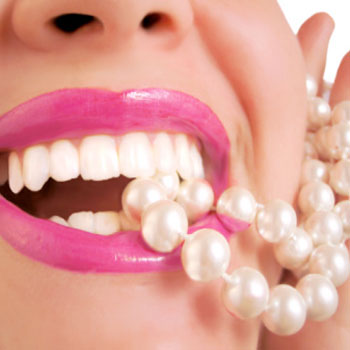How to Spot a Real Pearl in a Sea of Fakes

If you are a woman, chances are you know the difference between real and fake pearls, and could spot one just about anywhere given a close enough look. However, if you are a man who is considering buying pearls for a wife, girlfriend, or mother, you may need to have a little instruction to be able to tell the difference.
You may be wondering, should I even care if they are real or fake? The answer is yes-she will!
Real pearls say grace, beauty, commitment, and class. Fake pearls say dress up, teenager, and cheap-probably not the message you are wanting to convey to your sweetheart.
The fact is, you cannot go wrong by presenting that special lady with a necklace or earrings made from real pearls. Barbara Bush, Queen Elizabeth II, and other distinguished figures are often seen out and about, proudly wearing pearl jewelry.
It goes well with just about any outfit, and projects class and grace. Most pearls are produced by oysters living in either fresh or salt water.
Occasionally, a foreign substance, often a parasite, slips in under the oyster’s shell. It is very irritating, so nature tries to protect the mollusk by coating the substance with successive layers of nacre, the same substance from which its shell is made.
However, since genuine natural pearls, being rare, are expensive, you will want to make sure that you purchase the real things. Faux pearls (faux is French for false, or imitation) are so cleverly manufactured today that it is easy for an untrained eye to be fooled.
Here are some tests for you to decide the quality of the pearl before you purchase it. First, check the pearl’s shape-if it is perfectly round, it is probably fake.
Rub a pearl along the edge of your teeth. A real one will feel sandy and gritty, while a fake one will feel perfectly smooth.
Next, rub the pearl along a plate of glass. The faux pearl will leave no mark, while the real one will leave a faint white trail of nacre powder.
If you rub two pearls together, the real ones will feel rough and the nacre will leave a powdery residue. Faux pearls will feel smooth and slippery.
Examine the pearl under a magnifying glass. A fake will have an even, grainy finish, while the genuine pearl will have irregularities and uneven ridges of nacre buildup.
Check the drill holes. Real pearls have holes as small as possible, since their value is determined by weight.
If the pearl is an imitation with just a nacre coating, the hole will be larger and the nacre may flake off around the holes. Hold the pearls up to natural sunlight or under a bright indoor light.
Natural pearls will have variations of color and sheen. Imitations will appear round and perfectly matched.
In a necklace or bracelet, genuine pearls are more likely to have little knots between each one, so they can’t rub together. They are also likely to have expensive settings, such as gold, silver, or platinum.
Unfortunately, none of these tests are absolutely foolproof. Unscrupulous dealers have been known to coat glass or plastic beads with several layers of nacre and thus trick even the most careful customer.
To be perfectly safe, take the pearls to an independent, registered gemologist. He will x-ray the pearls and if they are genuine, he will be able to see the parasite that caused the formation of the pearl, the layers of nacre accumulation, and inner variations in density.
His charge for this service will be about one hundred and fifty dollars. If you are buying a very expensive set of pearls, this will be worth the cost.
When you consider that the cost of a genuine pearl necklace will amount to thousands of dollars, the cost of this service, to insure your peace of mind, is negligible. Don’t hesitate; it will be worth every penny when you watch that special lady proudly socializing with friends and relatives, secure in the knowledge that she is every bit as fashionably-adorned as Mrs. Bush and Queen Elizabeth.
As you bask in her obvious gratitude, appreciation, and enjoyment of your gift, you’ll probably conclude that it was worth every penny. After all, who doesn’t want to marry a Jackie Kennedy?
About the Author Tom Selwick has worked as a fashion designer for the past 18 years and written hundreds of articles about fashion and tiaras. Contact Info: Tom Selwick Tom Selwick09@gmail.com http://www.tiaratime.com
